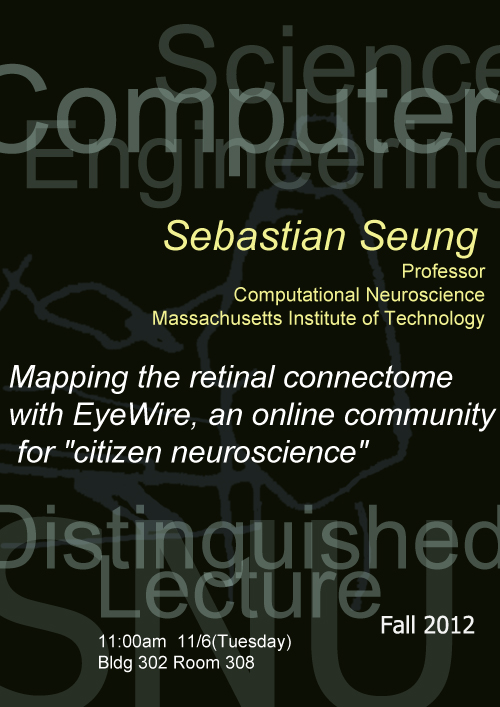[Distinguished Lecture Series] Mapping the retinal connectome with EyeWire, an online community for "citizen neuroscience"

요약

According to a doctrine known as connectionism, brain function and dysfunction depend heavily on patterns of connectivity between neurons. Connectionism has been explored theoretically with mathematical models of neural networks since the 1940s. It has proved difficult to test these models through activity measurements alone. For conclusive empirical tests, information about neural connectivity is also necessary, and could be provided by new imaging methods based on serial electron microscopy. The bottleneck in using these new methods is now shifting to the data analysis problem of extracting neural connectivity from the images. Our capacity to acquire "big data" from the brain has far outpaced our ability to analyze it. My lab has been developing computational technologies to deal with this data deluge. Based on these innovations, we have launched EyeWire, an online community that mobilizes the public to map the retinal connectome by playing a coloring game. Players analyze nanoscale images by interacting with one another and with artificial intelligence based on machine learning. I will describe preliminary efforts to map the connections of the J type of ganglion cell and understand the mechanisms of its direction selectivity.
연사 소개
Sebastian Seung is Professor of Computational Neuroscience at the Massachusetts Institute of Technology, and External Member of the Max Planck Society. He received his Ph.D. in Theoretical Physics from Harvard University, and formerly worked at Bell Laboratories. His laboratory at MIT is inventing technologies for finding connectomes, maps of connections between the brain's neurons. His goals are to understand perception, see the material basis of memory, and search for connectopathies, hypothetical "miswirings" of the brain associated with psychiatric disorders. His popular science book Connectome: How the Brain's Wiring Makes Us Who We Are was recently hailed in the Wall Street Journal by Daniel Levitin as "the best lay book on brain science I've ever read."
장병탁 교수 (02 880 1833) 권명주 조교 (02 880 1850)